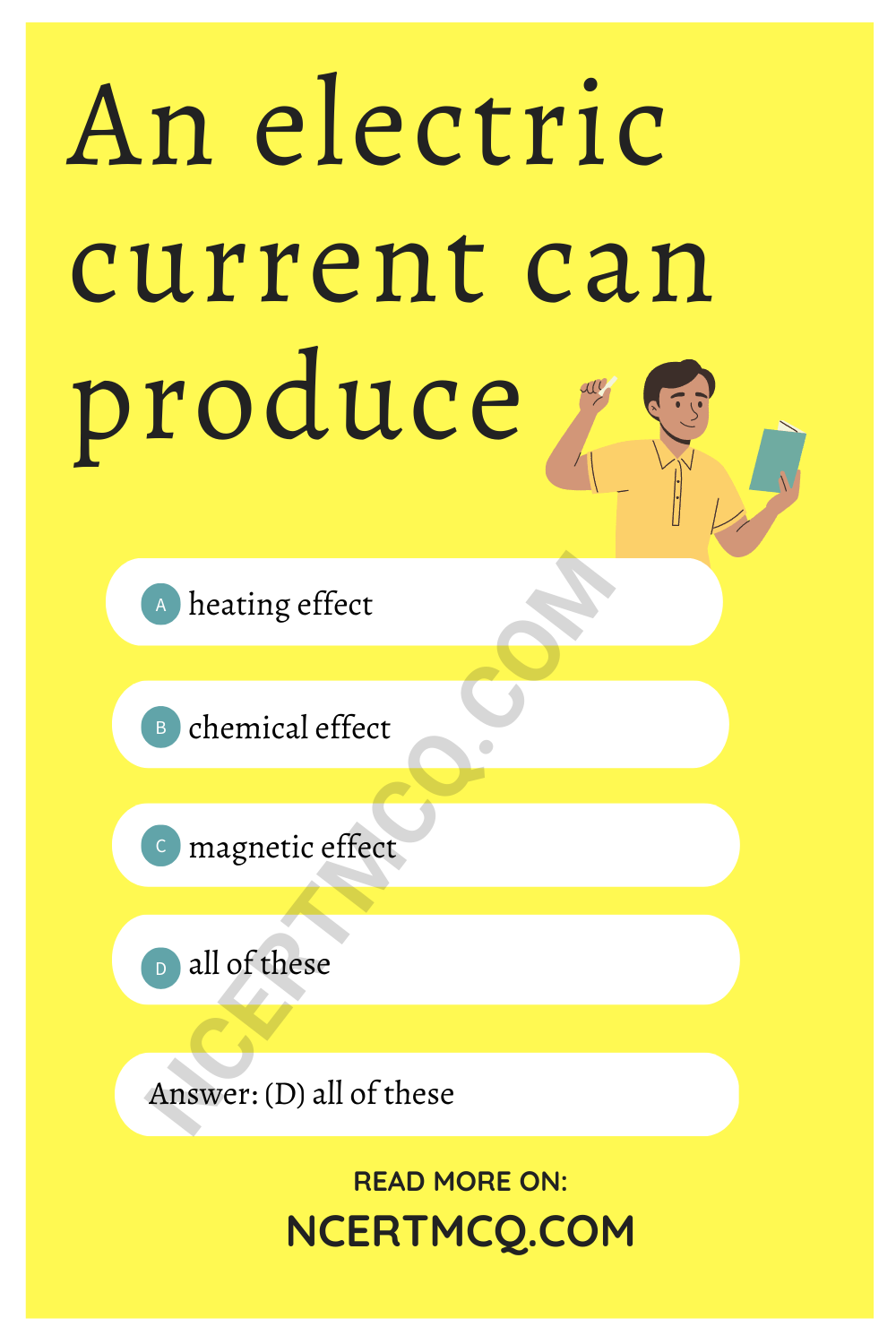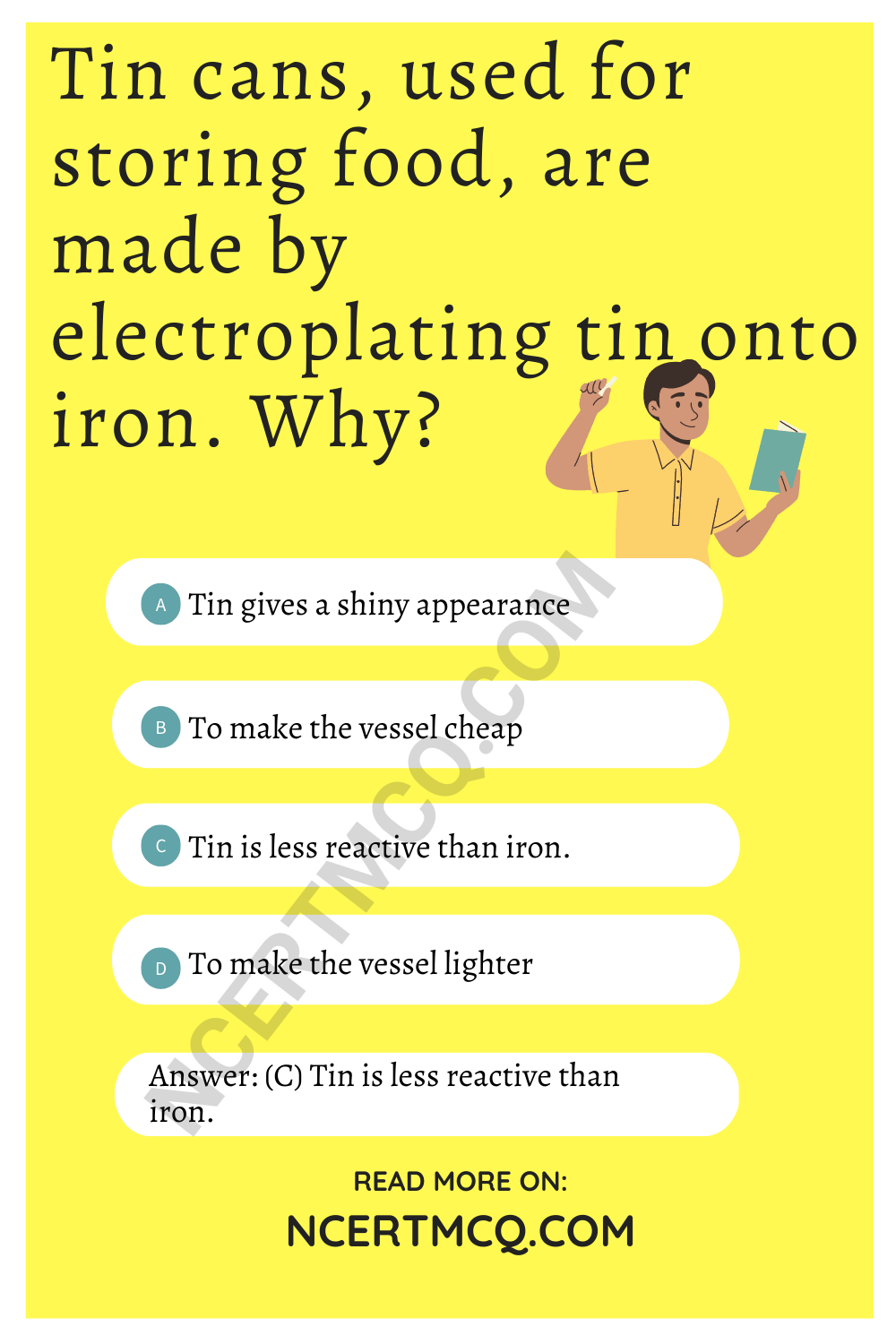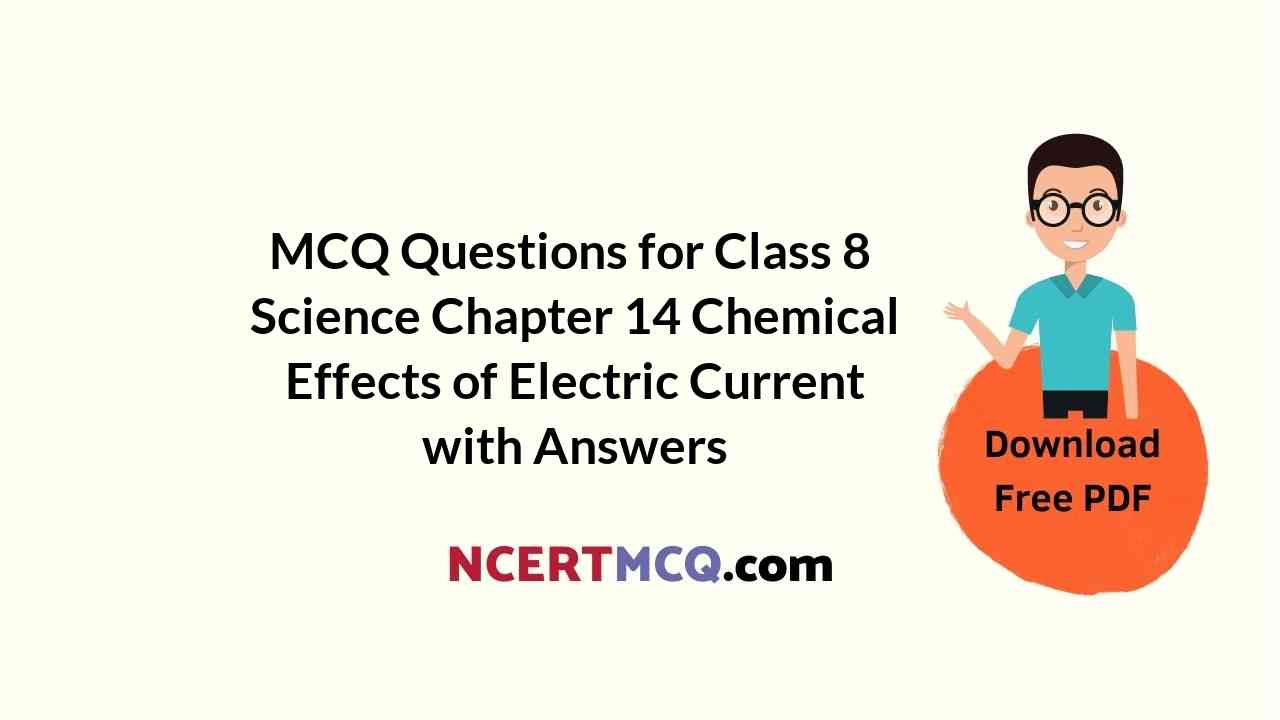Check the below Online Education NCERT MCQ Questions for Class 8 Science Chapter 14 Chemical Effects of Electric Current with Answers Pdf free download. MCQ Questions for Class 8 Science with Answers were prepared based on the latest exam pattern. We have provided Chemical Effects of Electric Current Class 8 Science MCQs Questions with Answers to help students understand the concept very well. https://ncertmcq.com/mcq-questions-for-class-8-science-with-answers/
You can refer to NCERT Solutions for Class 8 Science Chapter 14 Chemical Effects of Electric Current to revise the concepts in the syllabus effectively and improve your chances of securing high marks in your board exams.
Class 8 Science Chapter 14 MCQ With Answers
Science Class 8 Chapter 14 MCQs On Chemical Effects of Electric Current
Choose the correct option.
Chemical Effects Of Electric Current Class 8 MCQ Question 1.
Which of the following is a bad conductor of electricity?
(a) Distilled water
(b) Silver nitrate
(c) Sulphuric acid
(d) Copper sulphate
Answer
Answer: (a) Distilled water
Class 8 Science Chapter 14 MCQ Question 2.
Which of the following does not conduct electricity?
(a) Sugar solution
(b) Vinegar solution
(c) Lemon juice solution
(d) Caustic soda solution
Answer
Answer: (a) Sugar solution
Chemical Effect Of Electric Current Class 8 MCQ Question 3.
An electric current can produce
(a) heating effect
(b) chemical effect
(c) magnetic effect
(d) all of these
Answer
Answer: (d) all of these

Chemical Effects Of Electric Current MCQ Question 4.
Pure or distilled water is a
(a) poor conductor
(b) good conductor
(c) both (a) and (b)
(d) none of these
Answer
Answer: (a) poor conductor
Class 8 Chemical Effects Of Electric Current MCQ Question 5.
Which of the following is a good conductor?
(a) Brick
(b) Steel
(c) Plastic
(d) Cotton
Answer
Answer: (b) Steel
MCQ On Chemical Effects Of Electric Current Question 6.
Polythene is
(a) a conductor
(b) an insulator
(c) both (a) and (b)
(d) none of these
Answer
Answer: (b) an insulator
Class 8 Science Ch 14 MCQ Question 7.
Electroplating is based on
(a) heating effect of electricity
(b) chemical effect of electricity
(c) physical effect of electricity
(d) magnetic effect of electricity
Answer
Answer: (b) chemical effect of electricity
MCQ Questions On Chemical Effects Of Electric Current Class 8 Question 8.
Copper is
(a) a good conductor
(b) an insulator
(c) both (a) and (b)
(d) none of these
Answer
Answer: (a) a good conductor
Ch 14 Science Class 8 MCQ Question 9.
Waste from an electroplating factory must be disposed off
(a) in the nearby river
(b) in the nearby pond
(c) in the nearby cornfield
(d) according to the disposal guidelines of Waste Management Bodies
Answer
Answer: (d) according to the disposal guidelines of Waste Management Bodies
Class 8 Science Chemical Effects Of Electric Current MCQ Question 10.
An electrolyte is
(a) a metal
(b) a liquid that conducts current
(c) a non-metal
(d) none of these
Answer
Answer: (b) a liquid that conducts current
Chemical Effect Of Electric Current MCQ Question 11.
Flow of electron is called
(a) electrolyte
(b) electroplating
(c) electrodes
(d) electric current
Answer
Answer: (d) electric current
MCQ Questions For Class 8 Science Chapter 14 Question 12.
Which is not a non-electrolyte?
(a) Ethyl alcohol
(b) Sodium chloride
(c) Urea
(d) Sodium solution
Answer
Answer: (b) Sodium chloride
MCQ Questions For Class 8 Science Chemical Effects Of Electric Current Question 13.
An electric lamp glows due to
(a) heating effect
(b) magnetic effect
(c) chemical effect
(d) physical effect
Answer
Answer: (a) heating effect
Class 8 Science Chapter 14 Extra Questions MCQ Question 14.
Electroplating prevents
(a) corrosion
(b) passing of current
(c) dissociation
(d) shining
Answer
Answer: (a) corrosion
MCQs On Chemical Effects Of Electric Current Class 8 Question 15.
Which of the following is not used for electroplating metal articles?
(a) Nickel
(b) Silver
(c) Chromium
(d) Sodium
Answer
Answer: (d) Sodium
Question 16.
Iron objects can be protected by electroplating them with
(a) chromium
(b) nickel
(c) zinc
(d) all of these
Answer
Answer: (d) all of these
Question 17.
In LEDs, the longer lead (wire) is always connected to the _______ terminal
(a) negative
(b) neutral
(c) positive
(d) Any terminal
Answer
Answer: (c) positive
Question 18.
Tap water is a good conductor of electricity while distilled water is not because
(a) Tap water contain salts
(b) Distilled water do not contain salt
(c) Only (a) is correct
(d) Both (a) & (b) is correct
Answer
Answer: (b) Distilled water do not contain salt
Question 19.
When electrodes are immersed in water and electricity passed, the bubbles formed on the positive terminal is actually _______ gas.
(a) Hydrogen
(b) Carbon dioxide
(c) Oxygen
(d) Nitrogen
Answer
Answer: (c) Oxygen
Question 20.
When electrodes are immersed in water and electricity passed, the bubbles formed on the negative terminal is actually _______ gas.
(a) Hydrogen
(b) Carbon dioxide
(c) Oxygen
(d) Nitrogen
Answer
Answer: (a) Hydrogen
Question 21.
Why do we add little dilute sulphuric acid to copper sulphate solution during electroplating?
(a) To increase acidity
(b) To increase conductivity
(c) So that the colour becomes more prominent
(d) To burn copper sulphate
Answer
Answer: (b) To increase conductivity
Question 22.
A coating of _________is deposited on iron to protect it from corrosion and formation of rust
(a) copper
(b) aluminium
(c) Zinc
(d) silver
Answer
Answer: (c) Zinc
Question 23.
Chromium plating is done on many objects such as car parts, bath taps, kitchen gas stove etc. Why?
(a) It does not corrode but prevents scratches
(b) It looks beautiful
(c) It costs less
(d) Articles can be sold at higher price
Answer
Answer: (a) It does not corrode but prevents scratches
Question 24.
The process of depositing a layer of any desired metal on another material by means of electricity is called ___________.
(a) Electric plating
(b) Electroplating
(c) Electric depositing
(d) None of the above
Answer
Answer: (b) Electroplating
Question 25.
Some liquids are good conductors of electricity and some are poor conductors. Which one is a poor conductor?
(a) Acidic solution
(b) Alkaline solution
(c) Common Salt solution
(d) Distilled water
Answer
Answer: (d) Distilled water
Question 26.
Tin cans, used for storing food, are made by electroplating tin onto iron. Why?
(a) Tin gives a shiny appearance
(b) To make the vessel cheap
(c) Tin is less reactive than iron.
(d) To make the vessel lighter
Answer
Answer: (c) Tin is less reactive than iron.

Match the items given in column I suitably with those given in column II.
| Column I | Column II |
| 1. Closed path | (a) Good conductor |
| 2. LED | (b) Deflection of compass |
| 3. Carbon rod | (c) Positively charged ion |
| 4. Galvanisation | (d) Poor conductor of electricity |
| 5. Distilled water | (e) Coating with zinc |
| 6. Salt solution | (f) Electrodes |
| 7. Cation | (g) Light emitting diodes |
| 8. Magnetic effect of current | (h) Electric circuit |
| 9. Chromium | (i) Negatively charged ion |
| 10. Anion | (j) Electroplating |
Answer
Answer:
| Column I | Column II |
| 1. Closed path | (h) Electric circuit |
| 2. LED | (g) Light emitting diodes |
| 3. Carbon rod | (f) Electrodes |
| 4. Galvanisation | (e) Coating with zinc |
| 5. Distilled water | (d) Poor conductor of electricity |
| 6. Salt solution | (a) Good conductor |
| 7. Cation | (c) Positively charged ion |
| 8. Magnetic effect of current | (b) Deflection of compass |
| 9. Chromium | (j) Electroplating |
| 10. Anion | (i) Negatively charged ion |
Fill in the blanks with suitable word/s.
1. Substances that conduct electricity are called ___________.
Answer
Answer: Conductors
2. Substances that do not conduct electricity are called ___________.
Answer
Answer: insulator
3. A cation has ___________ charge.
Answer
Answer: positive
4. Some liquids are ___________ conductors of electricity and some are ___________ conductors of electricity.
Answer
Answer: good, poor
5. Distilled water is an ___________.
Answer
Answer: insulator
6. Distilled water when mixed with salts becomes a ___________ conductor of electricity.
Answer
Answer: good
7. Light emitting diodes (LED) glow even when a ___________ electric current flows through it.
Answer
Answer: weak
8. The passage of an electric current through a conducting solution causes ___________.
Answer
Answer: chemical reaction
9. Change in colour is an example of the ___________ effect of current.
Answer
Answer: chemical
10. There are ___________ wires attached to an LED.
Answer
Answer: two
11. In an LED, the longer lead is attached to the ___________ terminal of the battery and the shorter lead to the ___________ terminal.
Answer
Answer: positive, negative
12. Chromium has a ___________ appearance.
Answer
Answer: shiny
13. Distilled water is made by removing all ___________.
Answer
Answer: impurities
14. Iron tends to ___________ and ___________.
Answer
Answer: corrode, rust
15. A coating of ___________ is deposited on iron to protect it from corrosion and formation of rust.
Answer
Answer: zinc
16. An electric lamp glows due to ___________ effect of electric current.
Answer
Answer: heating
17. Electrodes are ___________.
Answer
Answer: conductors
18. The deflection in ___________ shows that current is passing.
Answer
Answer: magnetic compass
19. ___________does not corrode easily.
Answer
Answer: Chromium
20. An electrolyte is a ___________.
Answer
Answer: liquid
State whether the given statements are true or false.
1. Rubber is a good conductor of electricity.
Answer
Answer: False
2. Plastics are poor conductor of electricity.
Answer
Answer: True
3. All liquids conduct electricity.
Answer
Answer: False
4. Distilled water is free of salt.
Answer
Answer: True
5. Pure water conducts electricity.
Answer
Answer: False
6. Most liquids that conducts electricity are solutions of acids, bases and salts.
Answer
Answer: True
7. Electroplating is based on magnetic effect of electricity.
Answer
Answer: False
8. Small amount of some mineral salts are naturally present in water.
Answer
Answer: True
9. Chromium is carcinogenic.
Answer
Answer: True
10. An electric bulb glows due to chemical effect of electricity.
Answer
Answer: False
11. Distilled water when mixed with salt conducts electricity.
Answer
Answer: True
12. LED is an electric bulb which is used in a tester.
Answer
Answer: True
13. Deflection in compass needle is due to magnetic effect of current.
Answer
Answer: True
14. When electric current is passed through the copper sulphate solution, copper and sulphate ions are dissociated.
Answer
Answer: True
15. In an LED bulb, the shorter lead is connected to the positive terminal of the battery.
Answer
Answer: False
16. Electric current produces a magnetic effect.
Answer
Answer: True
17. Some liquids are good conductors of electricity and some are poor conductors of electricity.
Answer
Answer: True
18. Chromium has a shiny appearance.
Answer
Answer: True
19. Jewellery makers electroplate silver and gold on expensive metals.
Answer
Answer: False
20. Electroplating wastes are useful to human health and environment.
Answer
Answer: False
We hope the given NCERT MCQ Questions for Class 8 Science Chapter 14 Chemical Effects of Electric Current with Answers Pdf free download will help you. If you have any queries regarding Chemical Effects of Electric Current CBSE Class 8 Science MCQs Multiple Choice Questions with Answers, drop a comment below and we will get back to you soon.
Class 8 Science MCQ:
- Crop Production and Management Class 8 MCQ
- Microorganisms: Friend and Foe Class 8 MCQ
- Synthetic Fibres and Plastics Class 8 MCQ
- Materials: Metals and Non-Metals Class 8 MCQ
- Coal and Petroleum Class 8 MCQ
- Combustion and Flame Class 8 MCQ
- Conservation of Plants and Animals Class 8 MCQ
- Cell Structure and Functions Class 8 MCQ
- Reproduction in Animals Class 8 MCQ
- Reaching the Age of Adolescence Class 8 MCQ
- Force and Pressure Class 8 MCQ
- Friction Class 8 MCQ
- Sound Class 8 MCQ
- Chemical Effects of Electric Current Class 8 MCQ
- Some Natural Phenomena Class 8 MCQ
- Light Class 8 MCQ
- Stars and the Solar System Class 8 MCQ
- Pollution of Air and Water Class 8 MCQ
